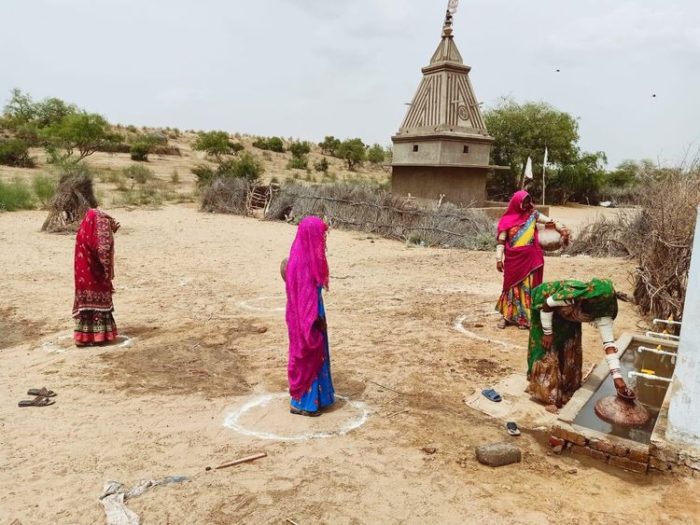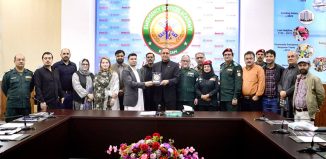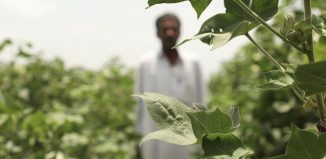Voices from the Ground: Communities fear a surge in gender injustices amid COVID-19
The coronavirus induced lockdown enforced all over the world has led to a standstill in all daily activities in the province of Sindh in Pakistan. All and any movement between urban and rural centers has been barred. In an effort to continue its program implementation, Community World Service Asia engaged community groups in organizing health sessions to continue raising awareness on the prevention and precautionary actions against COVID-19 among vulnerable populations in Umerkot and Mirpurkhas. The EVC[1] team stationed in Umerkot, facilitated the collaboration and consultations by introducing digital platforms like smart phones and WhatsApp groups as an alternative to physical trainings.
The online training sessions helped to sensitize members of Steering Committees, Theater groups and Community Groups on promoting social isolation and practicing basic hygiene and safety measures against COVID-19 to minimize virus transmission. The project team urged the community members that were trained to further share the lessons with the rest of the people living in their own villages and those nearby.
More than 800 health awareness sessions have been held in the last two months with community in the area, ensuring inclusions of people with disabilities, women, widows, the elderly and children. Since women in these rural villages are primary care takers for their families, separate and more focused sessions were held with them to develop a clear understanding on the safety protocols of COVID-19.
Traditionally, men are the household heads in these rural settings and are primarily responsible for earning an income and providing financially for their families. Most of these men in Umerkot and Mirpurkhas rely on daily labor to earn an income. Since the COVID pandemic and subsequent lockdown, the men are forced to stay home without jobs and incomes to bring home. While the women, who earned additional livelihoods through farming and home-based income generating activities, like kitchen gardening or handcrafting, are also facing loss of livelihoods but an increase in household responsibilities.
The structural inequalities built into our world are now more evident than ever. The gender dimensions of the pandemic are numerous and numbingly severe, but they are not new and not surprising. Women, girls and marginalized communities are particularly impacted by this new-age crisis. In Pakistan, on average, every one in four women experiences emotional, physical or sexual violence. This accounts for approximately eight million women grappling with various forms of violence every year[2]. The risk of violence has likely further increased as economic and social pressures mount amid the COVID-19 pandemic. Protection and response services are also under pressure. Local women in Umerkot and Mirpurkhas are facing a surge in domestic violence, restricted access to reproductive healthcare and rights, and a heightened care-giving burden.
With the men staying home, without jobs, and rising frustration, the stress and household responsibilities for women in these areas has increased many folds. Moreover, this region of Sindh has been hit by locust attacks and drought in recent times which already left these communities struggling for food security. With the COVID-19 and its associated lockdown, food shortage has further increased for many families here. Women are the last mouths to be fed in these traditional households, where feeding children and men is prioritized. This is leading to a further degradation in women’s health in these villages.
Community Voices in Corona Times:
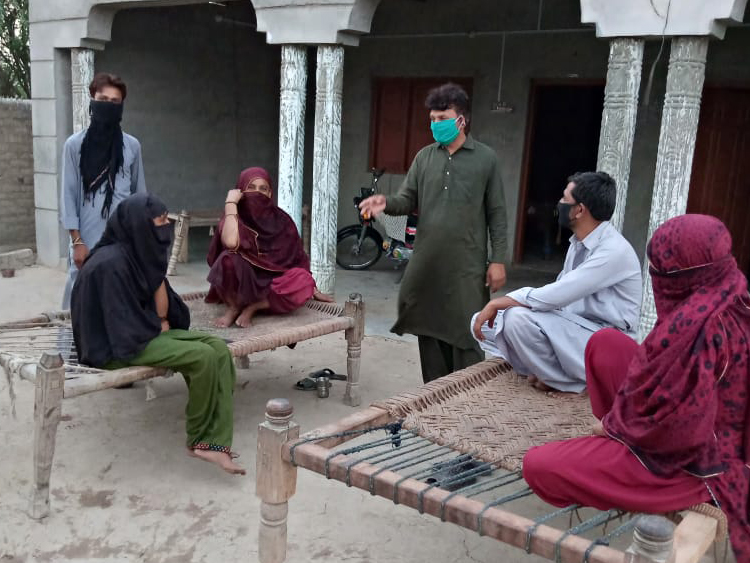
Ghulam Murtza Lashari is a member of the steering committee in Sobho Khan Lashari village which is located at a distance of 11 kilometers from Mirpurkhas. He shared that their village houses 690 people and 113 families. Seventy percent of the people in this village work on daily wages as part of the local labor workforce. “Families of our village are dependent on daily wages and they purchase ration for their households with that daily income that they earn. The current lockdown situation has led to a lack of income generation and has resulted in extreme food shortages here.”
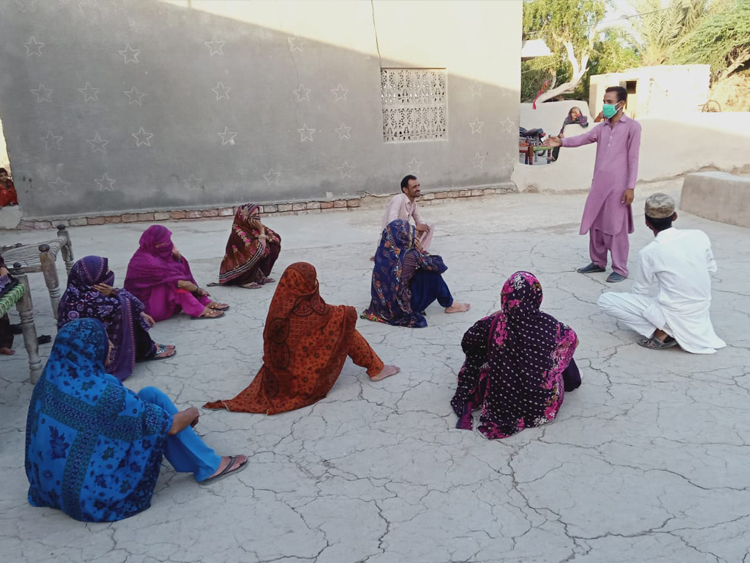
“Women are seriously impacted in the current situation. Pregnant women are also unable to seek proper healthcare. They rely on men who are still unemployed and unable to afford health services. Before the lockdown, our women were able to earn money by working in agricultural fields and would often use the money for their health care. Unfortunately, there is no work in the field now.” Irshad Ali, Community Group Member, Sobho Khan Lashari village, Mirpurkhas
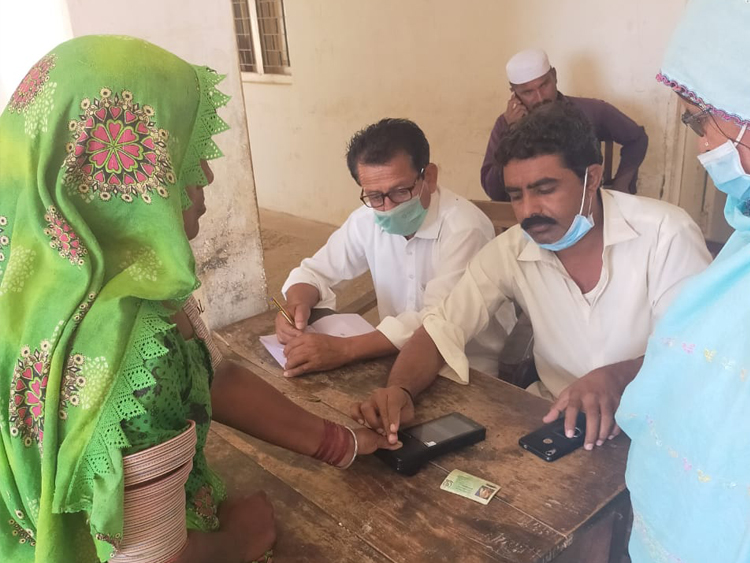
“Our village is five kilometers from the city of Umerkot, with a thousand families residing in the locality. The main source of income for our people is everyday wages through skilled and some unskilled labor work. As part of the Steering Committee, we gathered donations and distributed ration (food items), with the collaboration of prominent individuals and landlords to 146 of the poorest families. Moreover, we are helping the most vulnerable families to enroll in the emergency program of Pakistan’s Prime Minister Ehsaas Kafalat[3]. Members of the committee have delivered COVID precautionary sessions in our communities. We are worried about this situation because the women in our village will continue to be at high risk due to family care, domestic abuse, and malnutrition risks.” Rashida. President Steering Committee and DEG[4] member from Kharoro Charan
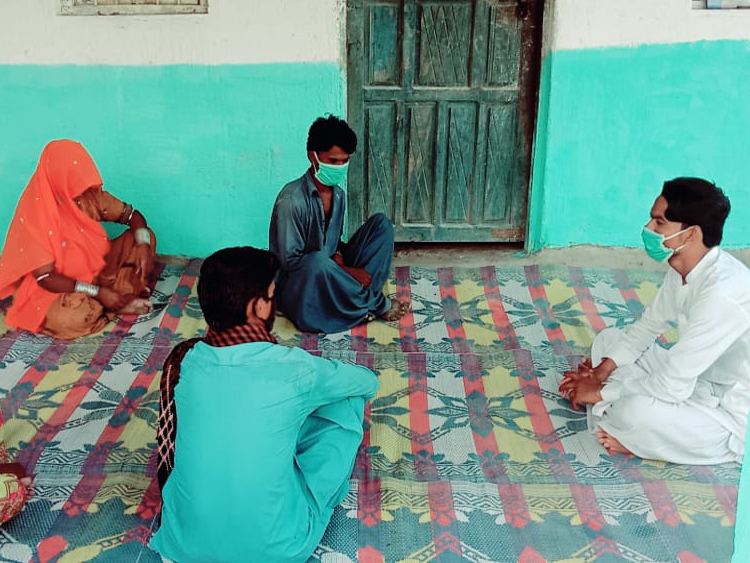
“We began discussions with the Chairman of the Union Council for nutritional care, provision of masks, soaps and other things to combat coronavirus and hunger. With this initiative, we have provided soaps and food to a few households, and distributed them among very poor people. However, several families are still waiting for food assistance and financial support. Over 600 people live in our village; 60 percent belong to the labor force, 5 percent have small shops in the villages and 20 percent are tenants. We have compiled lists of candidates, discussed with the local minister and the president of the union council, but nobody has looked back on the people yet. Women are facing multiple issues such as malnutrition, heavy work load and household conflicts due to financial stresses.” Parkash, Member of Steering Committee at Muhammad Ali Halepot village, Mirpurkhas
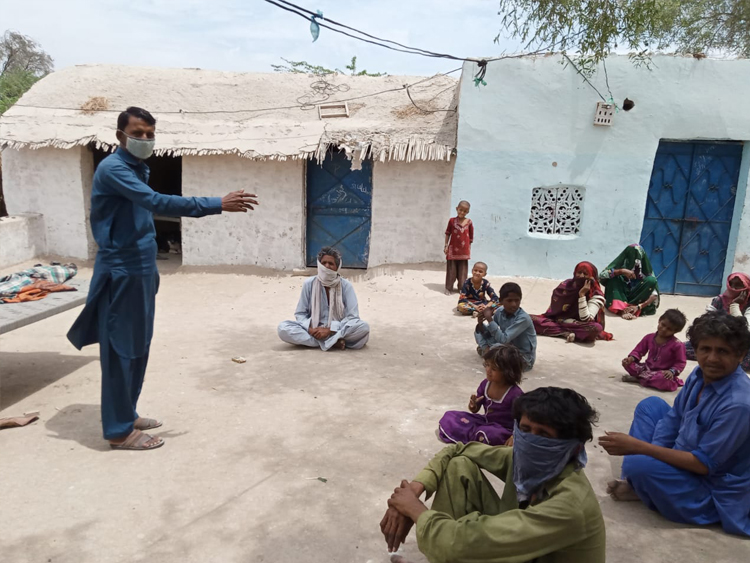
“The men are continuing to lose jobs here. Emotional stress is rising among families due to lack of resources and financial support. Women are struggling. If the situation does not change soon, problems of domestic violence will increase even more and will have a significant impact on the mental and physical wellbeing of women and children in these areas. All movement has been restricted. This is also an issue of concern since people are worried about accessing appropriate healthcare in case of contagions and other illnesses.
To help our people, the Steering Committee members negotiated with the local landlords to contribute wheat flour and ration to the poorest families of our village. As a result, the landlord agreed to donate ration to 50 widows from the village. We received 1700 soaps from the Union Council which we distributed among houses here. We are trying to do our best to help the people who are affected by the lockdown and unemployment. But much more has to be done.”Prem, Member of Community Group, Haji Chanesar Marri village in Umerkot,
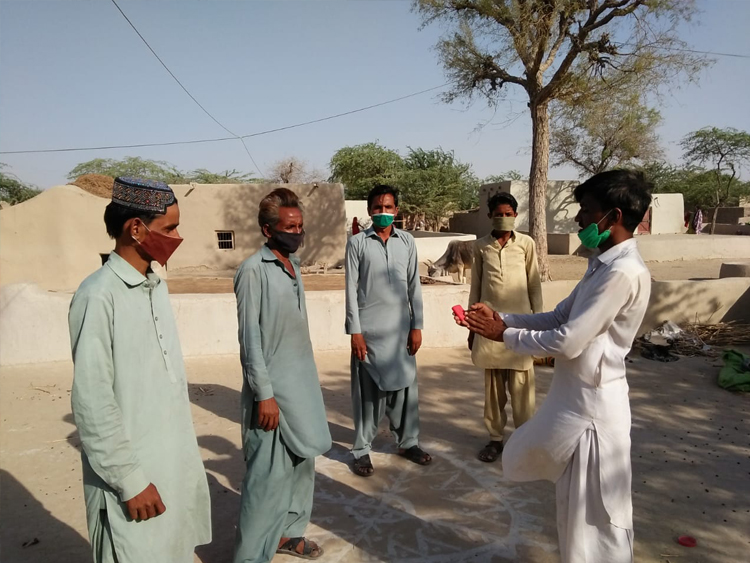
“Since the general OPD is closed, the local patients are facing a lot of difficulty as they are unable to access any medical facility or expert. With the absence of public transport, traveling to bigger central health centres is not an option either. I have three patients with asthmatic disease in my house. We recently faced several problems to provide healthcare to them as there was no health service nearby. Luckily, with the aid of a paramedic in our area, we were able to arrange a nebulizer for their respiration. With limited resources, cases like this are likely to rise and will be threatening human lives.” Kewal, Member of Community Group, Kharoro Charan village, Umerkot
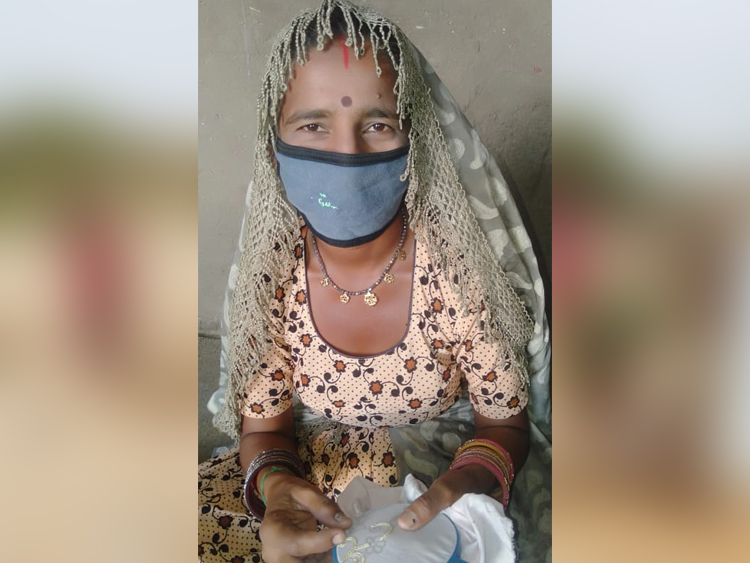
“Most women in the village support their families through their handicrafts production, which is largely based on orders they get from fellow community members and local and urban markets. Their husbands mostly live in faraway cities, such as Karachi and Hyderabad, working as tailors, masons, drivers, cooks or other jobs to earn better incomes for their families. Since the lockdown, both men and women in our village have suffered from lack of working opportunities. They are no handicraft orders coming in and most men have come back home as there is no work in the cities. It has become difficult to manage the household expenses with no or limited income coming in.” Kalawanti, an artisan from Kharoro Charan village in Unmerkot
[1] Every Voice Counts Project, implemented by Community World Service Asia in Umerkot and Mirpurkhas.
[2] UNFPA Pakistan 2020
[3] Government of Pakistan has launched Ehsaas Kafalat Program 2020 registration centers for merit-based financial assistance of poor and deserving women throughout the country.
[4] District Engagement Group





